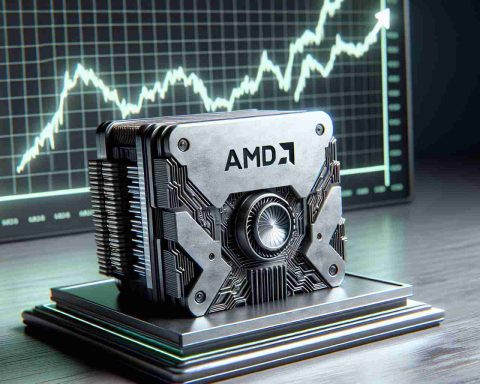In a recent turn of events, Nvidia (NASDAQ: NVDA) saw a significant decline during the latest trading session following its third-quarter earnings announcement. The stock, initially aiming for new highs, closed at $141.95, dropping 3.22%. Despite this decline, Nvidia’s stock has shown resilience over a broader timeframe, showcasing gains of 2.69% for the week and an impressive 194% since the beginning of the year.
Investors’ Concerns Weigh Heavily
Interestingly, Nvidia’s dip occurred despite outperforming earnings forecasts. The tech giant reported a stellar $35.1 billion in revenue, surpassing the anticipated $33.2 billion, with earnings per share at $0.81, better than the expected $0.75. Yet, caution crept in as experts raised issues regarding Nvidia’s future guidance.
Industry analysts expressed reservations about Nvidia’s prospects. Notably, Bernstein’s Stacy Rasgon highlighted a slightly dampened outlook compared to optimistic whispers, though he acknowledged the company’s potential upside in its Q4 forecast. Phillip Securities analyst Yik Ban Chong shifted his stance from ‘Buy’ to ‘Accumulate,’ raising his target price despite expressing concerns over initial Blackwell chip margins.
Market Sentiments and Growth Outlook
While some market analysts project uncertainty, others maintain a bullish perspective. Analysts like Ben Reitzes from Melius Research continue to see Nvidia’s dominance in AI as a compelling reason for potential stock gains. Reinforcing this, Rosenblatt’s Hans Mosesmann and Benchmark’s Cody Acree both increased their price targets, underscoring their confidence in Nvidia’s future performance.
Despite recent fluctuations, Nvidia’s influence remains potent, highlighted by its international ventures like providing technology for Denmark’s first AI supercomputer. As governments ramp up AI initiatives, Nvidia could see sustained growth, assuring stakeholders of its enduring prominence despite the stock’s recent stumbles.
Nvidia’s Rollercoaster: What Lies Beyond the Stock Fluctuations?
The recent fluctuations in Nvidia’s stock prices have put the tech giant under a magnifying glass, bringing to light deeper implications for various stakeholders. While the financial ebb and flow of Nvidia captures headline attention, there are underlying factors poised to affect communities, industries, and global dynamics.
Nvidia’s Technological Ecosystem: A Double-Edged Sword
Nvidia remains a powerhouse in AI and graphics processing, signifying not just financial prowess, but also industry influence. Its technology powers everything from video gaming to automotive AI, impacting how industries evolve.
One controversy stems from Nvidia’s significant role in AI, which while lucrative, raises questions about the ethical implications of AI deployment and data privacy. Communities and policymakers are increasingly scrutinizing how AI technology can be both a boon and a bane, affecting jobs, privacy, and new economic paradigms.
Connecting the World to AI Supercomputing
Nvidia’s involvement with Denmark’s first AI supercomputer signals a commitment to international tech collaborations. This potentially boosts innovation, providing smaller countries with the computational resources necessary to tackle global challenges like healthcare and climate change. However, it also raises questions about national dependencies on a single tech provider, which could skew economic and computing power balances.
The Human and Economic Impact: Pros and Cons
So, how do these developments affect ordinary lives and economies?
Advantages:
– Rapid Technological Advancements: Nvidia’s developments expedite progress in fields like medicine, energy, and digital communication.
– Job Creation in New Domains: As Nvidia expands AI capacities, new roles in tech sectors emerge, offering high-skilled job opportunities.
Disadvantages:
– Job Displacement: Automation, largely powered by Nvidia’s technology, risks rendering certain job sectors obsolete.
– Ethical Concerns and Privacy Issues: The dual-edged nature of AI technology presents new ethical dilemmas regarding surveillance and personal data use.
FAQs: Addressing the Common Queries
Q: Does Nvidia’s stock performance impact the tech industry at large?
A: Absolutely. Nvidia’s tech developments and stock performance serve as a bellwether for the tech industry. Its innovations push competitors to advance their own technologies, influencing market dynamics globally.
Q: How does Nvidia address the ethical implications of its AI technology?
A: Nvidia actively invests in creating frameworks for responsible AI use and collaborates with governments and NGOs to establish ethical guidelines. However, the complexity and rapid pace of AI advancements remain challenging to regulate fully.
Interesting Nuggets
Did you know Nvidia’s chips are behind not just AI but also the vast worlds in modern video games and cinematic visual effects? This versatility showcases the company’s wide-ranging impact across entertainment and tech spheres.
Links to Learn More
For more insights into Nvidia’s ongoing impact on technology and the pathway of AI, visit Nvidia’s official page. You can explore their latest supercomputer collaborations with DTU Copenhagen.
In conclusion, Nvidia weaves an intricate narrative of technological advancement fraught with opportunities and challenges. As it continues to shape the fabric of numerous industries, understanding both the promises and perils it presents is vital in navigating this new frontier.


























